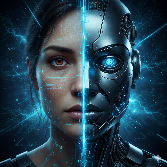Artificial Intelligence (AI) is no longer science fiction — it’s the invisible force driving our apps, cars, cameras, and even the stories we read online. Yet as it becomes more capable, so do our fears. Will AI take over our jobs, our privacy, or even our freedom?
Experts believe the fear is both real and misunderstood. While Hollywood imagines AI as a superintelligent threat, the reality is much more human — the real risks lie in who builds, controls, and deploys these systems.
The Real Threat: Human Misuse, Not Machine Malice
Today’s AI can analyze data, mimic creativity, and make predictions — but it doesn’t think. It doesn’t feel emotions, understand ethics, or decide right from wrong. That’s why, experts argue, the greatest threat comes not from AI itself, but from how people use it.
Poorly designed algorithms can reinforce racial or gender bias. Unregulated systems can spread misinformation or invade privacy. “AI mirrors human behavior — and that means it also mirrors our flaws,” one researcher explains.
Jobs and the Economy: Disruption or Evolution?
Automation is already transforming the global workforce. Millions of roles in logistics, retail, and administration are at risk, while new fields in AI management, data security, and robotics are emerging.
Economists warn that those who adapt will thrive, while those who resist may be left behind. The message is clear: AI won’t replace humans — but humans who understand AI will replace those who don’t.
The Need for Rules and Responsibility
The AI revolution is moving faster than regulation. Nations are scrambling to write ethical codes and safeguard data before technology outpaces the law. The European Union’s AI Act is one of the first serious attempts to classify risk levels — but global coordination remains a challenge.
Without oversight, experts warn that AI could become a weapon for manipulation, surveillance, or control. Transparency and accountability, they argue, are no longer optional — they’re urgent.
Balancing Fear with Vision
Despite the warnings, scientists insist that fear should not overshadow progress. Artificial Intelligence has the power to cure diseases, predict natural disasters, and personalize education. The challenge is to use it wisely.
As one AI ethicist puts it: “The question isn’t whether AI will be good or bad — it’s whether we will be.”
AI is, ultimately, a mirror of humanity: capable of brilliance or destruction, depending on who’s holding the controls. The future of AI won’t be defined by fear — it will be defined by how responsibly we choose to build it.




